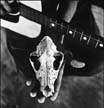STONES IN
MY PATHWAY
Photographs of Mississippi Blues
Culture
by Bill Steber
61 Highway is the longest road I know
Goes all the way from Chicago to the Gulf of Mexico
- Son Thomas, "Highway 61 Blues"
Driving along
Highway 61 on a muggy summer day, the road ahead disappears into wavering
bands of heat, telephone poles become rows of crosses, and overhead power
lines buzz like late summer cicadas. The highway rises out of Louisiana
swamps entering southernmost Mississippi to trace the Civil War through
Natchez, Port Gibson, and Vicksburg, before cutting through the heart of
the Delta like a long thin incision into Memphis, and weaving toward its
final destination somewhere in Illinois.
 RealAudio:
Bill Steber tells how he began this photo essay. RealAudio:
Bill Steber tells how he began this photo essay.
 In August of 1992, I drove on Highway 61 for the first time past Delta
towns like Lake Cormorant, Bobo, Alligator, Mound Bayou, Panther Burn,
Nitta Yuma, and Rolling Fork. I stopped in the little town of Leland in
search of bluesman and folk artist, Son Thomas. His son, Pat, met me at
the door of their weathered shotgun shack and invited me in. To my left,
a homemade casket held the carved likeness of a dead woman in a blue print
dress. On a shelf to my right sat a grinning clay skull with two rows of
human teeth and aluminum foil eye sockets. I found Son seated on the side
of his bed hunched over and holding aloft a cigarette with an arching three-inch
ash.
In August of 1992, I drove on Highway 61 for the first time past Delta
towns like Lake Cormorant, Bobo, Alligator, Mound Bayou, Panther Burn,
Nitta Yuma, and Rolling Fork. I stopped in the little town of Leland in
search of bluesman and folk artist, Son Thomas. His son, Pat, met me at
the door of their weathered shotgun shack and invited me in. To my left,
a homemade casket held the carved likeness of a dead woman in a blue print
dress. On a shelf to my right sat a grinning clay skull with two rows of
human teeth and aluminum foil eye sockets. I found Son seated on the side
of his bed hunched over and holding aloft a cigarette with an arching three-inch
ash.
Son Thomas
spent most of his life as a day laborer, grave digger, and part-time blues
musician, while entertaining at local parties around Washington County.
Despite international recognition late in life as one of the South's most
important blues and folk artists, he still struggled to make a decent living
with his art. The afternoon I spent with him talking about his life and
hearing his music made an indelible impression on me. I vowed to come back
as soon as I could. When I returned the following Spring, Son was lying
in a hospital bed dying of a brain tumor.
 Since that first visit, I've witnessed many changes in the Delta. Not only
has the blues world lost many important artists like Son, but the arrival
of casinos has brought with them a flood of fast food, chain stores, and
competition to the rural juke joints that help keep the Blues alive in
Mississippi. The plantation where Robert Johnson first learned music is
now home to three casinos, and billboards now pockmark Highway 61 where
once there was an unobstructed view of vast fertile cotton fields.
Since that first visit, I've witnessed many changes in the Delta. Not only
has the blues world lost many important artists like Son, but the arrival
of casinos has brought with them a flood of fast food, chain stores, and
competition to the rural juke joints that help keep the Blues alive in
Mississippi. The plantation where Robert Johnson first learned music is
now home to three casinos, and billboards now pockmark Highway 61 where
once there was an unobstructed view of vast fertile cotton fields.
These changes
are significant because the history of the Blues parallels the history
of Black Americans in the twentieth century. To many of the three million
African-Americans who migrated from the South in the first half of this
century, Mississippi is the ancestral homeland, the American "Egypt" from
which they escaped social and economic bondage. The same Mississippi soil
that transformed the Delta into the land of king cotton with the sweat
and suffering of slaves and sharecroppers also produced a cultural legacy
of music, religion, and rural traditions, that shaped and defined the African-American
community. The Blues, our country's first original music, was born of field
hollers, railroad chants, black spirituals, jump-ups, European folk music
and the ability of the human spirit to dignify itself in the face of oppression.
These photographs
are my attempt to document the living legacy of this rich cultural tradition.
The Blues is our country's most important musical art form for it has shaped
every musical form developed in it's wake, including gospel, jazz, rock
and roll, bluegrass and modern country. It's echoes still resound in the
sweaty juke joints and dusty cotton fields along Highway 61.
- Bill Steber
I got stones in my passway
And my road seems dark at night
I got a pain in my heart
It has taken my appetite
- Robert Johnson, "Stones in my Passway" |